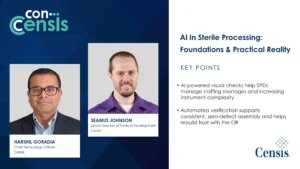Improving Patient Safety Through Non-Invasive Sensing Platforms for Hospitals
Patient safety is one of any healthcare institution’s primary concerns and goals. In a surgical setting, it’s paramount. Training and maintaining a well-trained staff are often challenging in healthcare, and an understaffed hospital could impact patient safety. Despite all precautions and best efforts, preventable medical errors during or after surgery occur at an estimated 4,000 occurrences per year in the United States. From wrong surgery performed, wrong surgery location, and unnecessary injury during surgery, every mistake is costly to the patient and the healthcare institution.
How can healthcare reduce the number of surgical errors? Can technology and AI play a role in improving patient safety?
Kevin Stevenson, host of I Don’t Care, took a closer look at the issue with his guest, Yeshwanth Pulijala. Pulijala is the Founder and CEO of Scalpel, a UK-based healthcare technology company taking a unique approach to improving surgical efficiency and patient safety through automatic identification and classification of surgical inventory without tags.
Pulijala, trained as a dentist, saw many patient safety issues during his time in healthcare and decided to do something about it.
“In my journey, I’ve seen things going wrong in hospitals,” Pulijala said. “Sometimes it has to do with simple logistic issues like bringing the wrong patient into the operating theater, but other times not having the right implant in the operating room. I was heavily driven by how we improve patient safety in surgery. With that mission, we started Scalpel in 2017 here in London.”
Stevenson’s conversation with Pulijala includes the following:
- How Scalpel is solving patient safety in healthcare surgical settings
- The economic value of Scalpel’s platform to the hospital and health system
- How healthcare systems partner and engage with Scalpel
“We don’t depend on any physical tags on surgical equipment,” Pulijala said. “We identify a surgical instrument based on how it looks, so it’s a computer-vision-based approach. The kind of technology you would use every day on your phone to look at and unlock it. Your face recognition is working that way. Similarly, this is an instrument recognition and object detection technology. That means we need to ensure we have the data set that identifies the instruments within your unit.”
About Yeshwanth
As the Founder and CEO of Scalpel, Yeshwanth Pulijala leads a passionate team of engineers and medics who build AI tools to enhance patient safety in the operating room. Trained as a dentist, Pulijala has over eight years of interdisciplinary experience in healthcare and technology (virtual reality, augmented reality, and computer vision). He previously built a startup (Open Simulation) to provide low-cost surgical simulation using augmented reality. In his doctoral research, Pulijala designed and evaluated one of the first immersive virtual reality training tools for oral and maxillofacial surgery.









